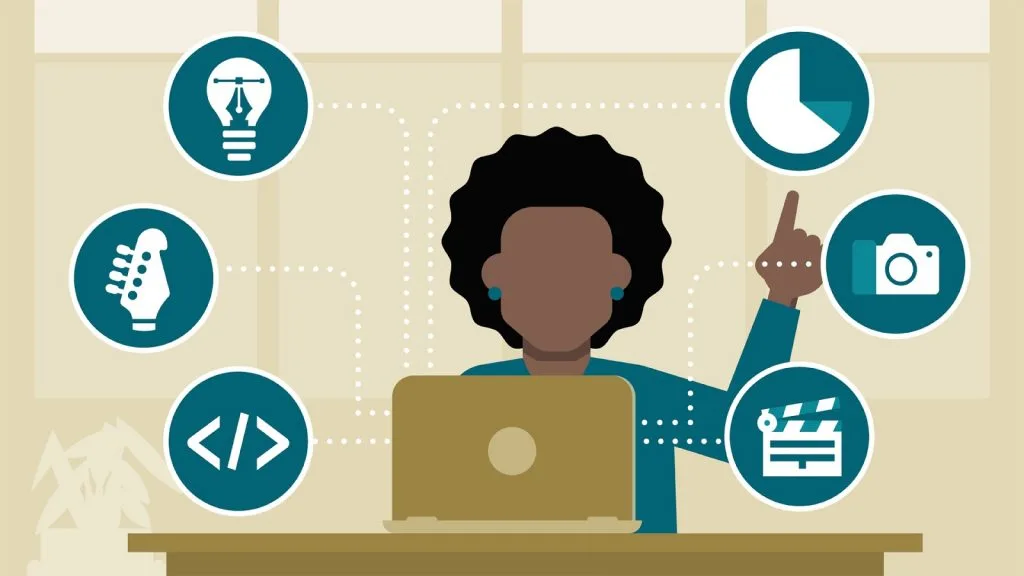- Best LinkedIn Learning Courses (Lynda Courses) - March 31, 2020
- EdX vs Coursera: Which is the Better Online Platform? - March 24, 2020
- Best Online Bookkeeping Courses Worth Taking - March 24, 2020
Some of the best courses you can take this year are right at your fingertips. But even if you’ve never even heard of Lynda (now LinkedIn Learning), it’s certainly worth trying.
To cut right to the chase, these are the courses we highly recommend in various disciplines this year:
What LinkedIn Learning Courses are Worth Taking?
While LinkedIn Learning (Lynda Online Courses) offers a seemingly endless catalog of courses, many worthwhile, what you should try this year depends on your personal and professional interests. That said, we do recommend courses for software, web, and technology even more so, simply because the majority of positive reviews and even LinkedIn itself seems to tout these courses the most. We’ve gathered the most popular Lynda courses for your consideration.
Of course, correlation does not signify casualty. That is, it is also possible courses such as these top Lynda courses are the most in demand, and thus will produce more reviews and more positive reviews overall. While our list does include a number of courses on the web, tech, and related industries, we’ve also added some creative courses.
The Best Courses on Lynda / LinkedIn Learning
- Web Design: In this course, you’ll learn the basic concepts of HTML5, CSS, and Javascript. The course will also go over design trends, plus there’s an offer for expert career advice.
- Video Production: While this course is good for personal and casual use, video production also helps you produce higher quality and more professional videos. This is a great course for anyone who is thinking of doing freelance work or even going on Youtube. This is actually an entire category, with courses in editing, vlogging, cinematic composition, pre-production, and lighting, among others.
- Teacher Professional Development: As an educator, it’s always a good idea to stay up to date and challenge teaching practices, constantly to evolve to different student demographics and technology. These courses offer a wide range of support and include specialized topic courses such as student-teacher/ student-peer communication; time management; and leadership foundations.
- Small Business Marketing: Small business marketing courses can help your business draw a larger client base, or even help with startups. Social media marketing, branding foundations, and other foundational skills, such as Search Engine Optimization are all highlights.
- Screenwriting: This may seem like a wildcard, but hear us out. Screenwriting is always going to be in demand, and even if you don’t want to become a professional, screenwriting can open you to creativity, expand your mind, and help you think about things in new and innovative ways. Their course actually focuses on a lot on the technical end, with instruction on how to use Adobe Story, format scripts, and even schedule shoots.
- Photography Foundations: Courses are offered in nearly anything you’d want to know about photography, whether you’re a beginner or even a professional looking to sharpen your skills. Learn about shutter speed, camera modes, composition, autofocus, and specialty lenses.
- Operating Systems: From networking foundations to server-specific courses, these are great introductory courses.
- Mobile Apps: With the global market for apps projected to exceed $189 billion by 2021, there’s no reason not to at least consider taking a course in this subject this year. Android and AOS app development; analytics, and learning how to implement different features are just a few of the course concentrations.
- IT and Hardware: These courses are generally helpful, wide and varied. Most courses focus on installing and working with hardware.
- Data Analysis: Data analysis is one of the hottest fields on the job market right now, but even if you don’t have a specific degree of background, taking coursework can help you better understand how data is organized and how businesses are run. Learn SQL, R Statistics, and Tableau, among many other concepts.
Honorable mentions for LinkedIn courses worth taking this year include Game Design, E-Commerce, B2B Marketing, and Drawing Courses.
Lynda Online Courses has made a name for itself recently as its courses have been offered in a traditional resource: public libraries. All of the local libraries in San Luis Obispo County, California will as of this December be offering free Lynda courses for public card holders, including basics like Microsoft Office and Adobe Creative Suite; as well as courses on basic operating systems and even more specialized courses like coding.
Across the country in Scotch Plains, New Jersey, the local library also announced this month that they will begin offering cardholders a free subscription to the entire library of over 4,000 video courses as well as downloadable applications. And in Ohio, cardholders statewide will be able to enroll in Lynda courses for free as part of the statewide expansion of an online learning initiative. The three year agreement, valued at $710,000, will give access to all of Lynda courses to anyone in the state who belongs to a library. It’s being paid for by the Public Library Fund, and residents only need to know their library and pin number for access to over 12,000 courses.
But what’s behind this trend? And what makes Lynda course so worth trying, at least as advocated by local and public libraries?
The Rise of Online Classes
We don’t need to tell you that online courses, in general, have gained traction. But the extent to how much traction they’ve gained is pretty amazing. Between 2015 and 2016, enrollment in online courses in general outpaced previous years and had an estimated growth rate of 5.6 percent. In the fall of 2016, over 6 million college undergraduates alone enrolled in at least one online course to satisfy graduation requirements.
Wendy Croix, writing for World Wide Learn, however, argues that it’s not just increased popularity of online courses that is changing, but even the idea of who the ‘typical learner’ is. Virtual campuses, and also continuing education courses offered online allows more access to people who might otherwise not take courses.
While it’s hard to pinpoint just how much continuing education and general educational courses are offered online, trends at colleges and universities point to just how popular online courses have become as a way to improve access, lower costs, and adapt to an increasingly evolving tech world.
Over 60 percent of faculty at colleges across the nation teach, or have taught a virtual/ distance learning course. Nearly a third of students are currently enrolled in at least one online course, and a sizable number of adults are pleased with the online experience.
Even overseas online courses are rising in popularity, both for college students and adult learners. In a report by The Sydney Morning Herald, more and more students are turning to online courses to juggle raising children, holding down full time or multiple part time jobs, or other obstacles that would otherwise be prohibitive.
The rise of continuing education

The rise of online courses, both in degree programs and general education, like Lynda, unsurprisingly aligns with the rise of continuing education courses. An aging and growing population of potential students increased accessibility, and an evolving market requiring more and continuous learning are all factors.
Lifelong learning has become more and more essential, especially in certain fields that are constantly and rapidly evolving, such as engineering, information technology, and medicine.
But even outside of professional pursuits, lifelong learning, and more and more acceptance, and even encouragement of students of all ages and learning paths of life has helped propel enrollment in online non-degree courses like those offered by Lynda. The desire and ability to continuously learn new things makes online courses beneficial for anyone, even if they are retired or not seeking to advance their careers. In fact, continual adult learning can improve brain health, increase confidence, and may even protect some against degenerative diseases such as Alzheimer’s.
And it may have something to do with the self-improvement and personal development industry, which is worth nearly $10 billion and growing. Instead of quick and specious fixes, online courses give students the ability to learn what they want to learn, develop or improve skills, and pursue subject areas they have always wanted to.
The message: with the increase of online courses, more and more adults of all ages are seeking to learn new things. And with online courses, there’s less and less stigma and more encouragement for open enrollment no matter your goals.
Why should I consider taking courses on LinkedIn Learning?
Whether or not online courses will be worth taking for you depends on your ability to be focus, self-disciplined, and take a high level of initiative. Still, general education courses like those offered by Lynda are for the most part low pressure, low cost, and specialized. You can also get great LinkedIn Learning certificates
Taking online courses in general, as we’ve mentioned, has a number of benefits, including flexible schedules, no commute time, more flexible curriculums (in some cases), increased affordability, and the ability to choose exactly what specialized course you wish to pursue.
But general education like LinkedIn Learning courses also are especially beneficial to take in that they remove many of the barriers and onerous requirements of a degree or certificate programs. General education courses won’t officially qualify you for a position, but they can be an excellent way to pad your resume and skills, and introduce you to a topic, in pursuit of professional or personal interests, in a low risk and less stressful manner.
Most are also open enrollment, meaning you don’t need specific degrees or prerequisites to take a course. If there’s a hobby you’ve always wanted to pursue, a subject that’s always compelled you, or something you’ve always been afraid or to busy to learn, it’s worth taking a look at the general education LinkedIn Learning courses offer.
What exactly is Lynda (Now LinkedIn Learning)?

Lynda Online Courses is one of the most popular companies offering online courses in subjects as varied as the principles of photography to web design to business marketing. As we mentioned before, Lynda courses are not part of a certified degree or certificate program but are instead lower cost personal education courses – We’ll get into the LinkedIn Learning cost below.
Lynda is considered one of “online learning platforms” to help individuals learn in the fields of software, business, technology, and creative fields. But these aren’t just any courses taught by anyone. One of the reasons Lynda is one of the leading online learning platforms is because it provides professional and interactive courses and materials.
Lynda was bought up by LinkedIn, the leading professional networking site, back in 2015. LinkedIn learning on its surface mostly caters towards professionals and clients in the business world, showcase business, and computer-oriented Lynda courses. However, if you go through the Lynda site you will more readily see other course offerings.
By offering different subscriptions, from corporate, academic, government, and individual, Lynda is an open-access learning platform for anyone looking to develop or sharpen skills and continue or engage in the new subject material. Clients have included individual students, project and IT managers, schools, non-profit organizations, government organizations, and businesses. Professional organizations that use Lynda include Adobe, Full Sail University, Patagonia, NBC, and the University of Southern California.
What do customers say about taking LinkedIn Learning courses?
While all LinkedIn courses are a different experience, it’s always a good idea to browse external reviews before enrolling in an online course. Here are some general customer and expert review opinions:
- PC Mag featured Lynda as “an outstanding resource for video-based, online learning, particularly if multimedia software or coding skills are what you need”. The review also gave a thumbs up for affordability, a huge selection of courses, and accessibility. The downsides PC Mag listed included that there is no per-video and per course access; PC Mag also mentioned that for some material, you can find free and helpful videos outside of Lynda. Overall, the review mostly praised Lynda, but mostly in the context of technology and computer and software oriented courses.
- The E-Learning Coach: Run by Connie Malamed, a learning experience design consultant, this blog takes a look at online courses around the web. In her Lynda review, she praised the learning platform for course organization (small segments for better focus and so it’s more practical to start and stop); high quality of instruction (including systematic teaching, real-world examples, and interactive design); informed but approachable instructors; payment flexibility; accessibility; and different subscription options. She did note that, for e-learning courses, supplemental materials, such as ‘exercise files’ for certain applications were only included for premium members.
- Consumer Affairs: Consumer Affairs is always a safe bet to go to for a review, and though their review of Lynda is more limited, it does provide some more information. It tells us, first of all, that the platform was launched in 1999, is based in California, and it also gives a direct phone line (though this can be found on Lynda as well). The platform is praised yet again for its software and technology courses and touts features such as unlimited access (billed by month vs credit), software specific training, frequent updates to courses, and affordable prices.
- Customer Reviews (Trust Pilot): Customer reviews are also good to look at. On Trustpilot, with a meager 32 reviews, the learning platform earned an average, or three-star rating, though 53 percent of customers rated the courses as “excellent,” the highest possible rating. Most customers were pleased with the online training provided for software and computer and technology courses. Most of the complaints aligned around trying to cancel subscriptions and being unsatisfied with customer services, so make sure you understand how to cancel, and double check to make sure your subscription has been cancelled. Getting a confirmation in writing is always a good idea, to be safe.
What subscription plans does LinkedIn Learning offer? LinkedIn Learning Cost

Unless you have the good fortune of belonging to a library that’s partnered with Lynda, you will have to pay for courses. Not unlike other subscription services like Netflix, you can sign up for a free one month trial and cancel at any time. Just note that in case you want to cancel it, you need to do it after the first month, otherwise they will charge you for the second one.
So, how much is LinkedIn Learning?
You can sign up for one of two plans:
- Annual: If you sign up for a year plan, you’ll pay $19.99/month, which is an estimated savings of 17 percent over using the monthly plan for a year. You can take a free trial here.
- Monthly: This lower commitment plan runs you $29.99/ month. You can take a free trial here.
What do subscriptions come with?
You don’t need to decide right away what courses are worth trying this year because, unlike other online programs, you pay by month rather than credit. That means you can take as little or many courses in a period of time that you can complete. When you pay for a subscription, you’re getting access to a library of courses.
Either basic subscription plan comes with the same benefits and resources, so we suggest at least starting with the monthly plan and only opting for the annual plan if you are certain you’ll use it that long. With both subscription plans, you’ll get:
- Access to over 13,000 courses, with new courses, regularly added and existing courses regularly updated
- Personalized course recommendations that are given based upon your occupation, skills, interests, and goals
- The ability to learn anytime, with apps for IOS and Android (for premium members)
- Certificates of completion awarded
- Practice quizzes and other resources (but exercise files are for premium LinkedIn members)
- A LinkedIn Learning mobile app for internet-free viewing.
- Access to LinkedIn Premium Career features
You’ll also get experts in the field of choice, video instruction, interactive material and video lectures. Do note that some options are only for premium members.
Should I be worried about system requirements?
Luckily, system requirements for Lynda courses are fairly basic. For most of the course, which is largely comprised of video demonstrations, lectures, and real-world examples, you’ll need internet access, with 3G or 4G Wi-Fi for the best viewing experience. You’ll also want to have an updated internet browser. Lynda works best with Safari, Microsoft Edge, Firefox, Chrome, and Opera.

